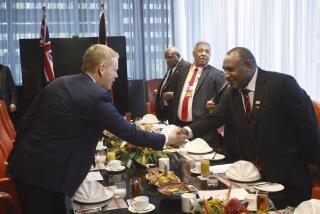Serbia, EU sign political accord
- Share via
BELGRADE, SERBIA — Serbia’s pro-West president and the European Union on Tuesday reached a long-delayed agreement to forge closer ties, but harsh reaction among many Serbs immediately threatened both the pact and the leaders who backed it.
European countries hoped the agreement would boost democratic forces in Serbia, with national elections less than two weeks away. But the gesture may backfire.
The controversy highlights the power struggle in Serbia between moderates who want to be part of Europe and hard-line nationalists who maintain that Europe’s support for the breakaway province of Kosovo makes integration untenable. The fight is intensifying ahead of the elections, in which bitterness over the loss of Kosovo may hand victory to nationalist radicals.
Signed at a brief ceremony in Luxembourg, the so-called Stabilization and Association Agreement enhances trade and political links and clears the way for Serbia to eventually be considered for membership in the European Union. However, it was immediately frozen pending Serbia’s cooperation with the war crimes tribunal at The Hague, making Tuesday’s signing largely symbolic.
Several European governments had opposed the accord because Serbia has not handed over top war crimes suspects who remain fugitives more than a decade after the fierce Balkan wars left tens of thousands of people dead and the former Yugoslavia a shambles.
Belgium and the Netherlands at the last minute lifted their vetoes, which allowed Tuesday’s deal to go ahead.
For several European officials, the more important value of the agreement with Serbia was to boost moderate, pro- democracy forces inside the country. Serbian President Boris Tadic, who attended the signing in Luxembourg, agreed.
“Many enemies of the European future of Serbia have been frightening the citizens of Serbia that in the EU our identity will be endangered,” he said, referring to the ultranationalist political parties at home. He spoke in Serbian, and the remarks and signing ceremony were broadcast live on major Serbian television stations.
But Tadic’s rivals immediately seized on the accord as an election issue, portraying it as a sellout because, they maintain, Europe is trying to buy Belgrade’s acquiescence to Kosovo’s independence.
Vojislav Kostunica, the caretaker prime minister of Serbia, said Tadic was in effect accepting the independence of Kosovo, a “shameful and illegal” act. He said the next government would cancel the pact.
“We will never allow to anybody to sign [away] the independence of Kosovo on behalf of Serbia, and that is why today’s Tadic signature is worth absolutely nothing,” Kostunica said.
His party likened the signing of the pact to “the seal of Judas,” and others said they would move to have the president impeached once a new parliament is seated after the May 11 vote.
Tadic and his supporters argue that Serbia needs closer relations with the West to end its long, crippling isolation after atrocities committed by Serb forces in the Balkan wars made the nation a pariah.
“From today on, the path toward Serbia’s full EU integration is irreversible,” said Foreign Minister Vuk Jeremic, a Tadic ally.
Kosovo, a province dominated by ethnic Albanians, seceded from Serbia on Feb. 17 with strong U.S. backing and recognition from many European countries. Most major Serbian politicians vehemently oppose the loss of Kosovo, rejecting its secession as a violation of international law, but they vary on how intently to fight it and whether relations with Europe should be sacrificed in the cause.
The ultranationalist Serbian Radical Party, whose leader is on trial for war crimes, is slightly ahead in preelection polls, with Tadic’s Democratic Party close behind. The International Crisis Group, a watchdog organization, warned last week against any effort by European or U.S. officials to bolster Serbian moderates.
“Public anger over Western support for Kosovo’s independence is such that any attempt by the EU or U.S. to support pro-Western parties prior to the elections risks strengthening the nationalist vote,” the group’s senior advisor, James Lyon, said in a statement.
--
Times staff writer Tracy Wilkinson in Rome contributed to this report.
More to Read
Sign up for Essential California
The most important California stories and recommendations in your inbox every morning.
You may occasionally receive promotional content from the Los Angeles Times.










